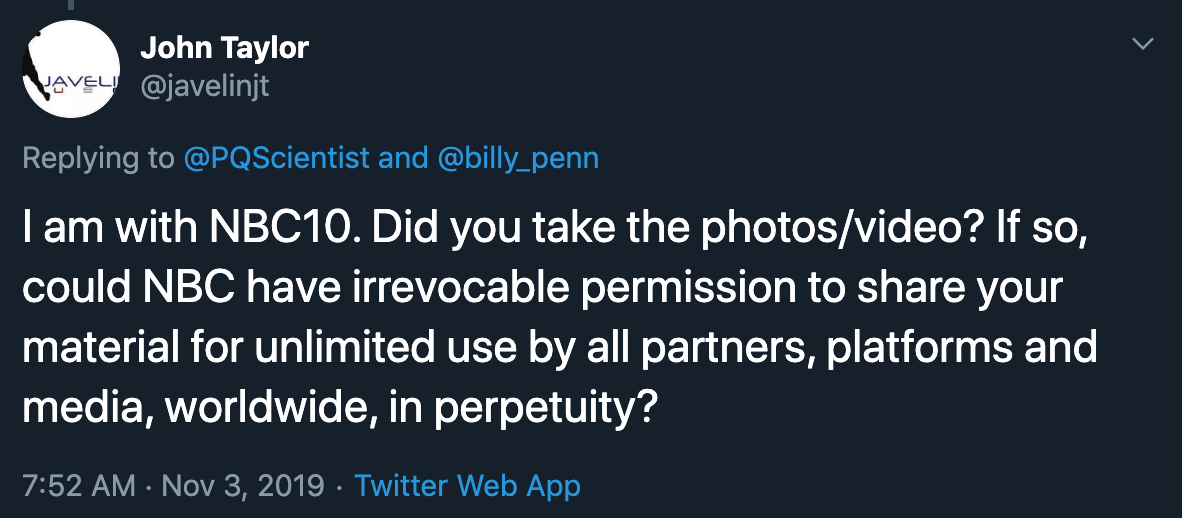When TV Stations Reach Out for Your Video on Social Media
/Earlier this week, FTVLive showed you a Twitter post from a person in Philly that shot video of water shooting from the top of One Liberty Place in downtown Philadelphia.
After he posted the video and Assignment Editor from WCAU sent this message to the poster:
A number of people called out the Assignment Editor for his aggressive reply.
But, he is basically doing what the media companies lawyers want him to do before they air video from social media.
This is the Twitter reply that NBC has been using since 2017:
“Can you confirm that you shot the photo/video you’ve sent us? And will you irrevocably grant NBC non-exclusive permission for unlimited use by all partners, platforms, and media, worldwide, in perpetuity/indefinitely?’
Licensor reply should be:
“I agree.
One NBC staffer explains why this needs to be done:
When I reach out to a person on social media or text them or email them… I usually apologize by saying, “forgive me for being so formal, but our lawyers make me ask this.” Of course, most “normal” people have no idea what all of that stuff means and it’s intimidating to them.
But what it really stems from is viral video. When some regular citizen happens to catch a funnel cloud moving over a neighborhood with their cell phone camera and posts it to social media, the video becomes a hot commodity. There are companies that monitor social media feeds constantly (they watch facebook, twitter, etc) to look for “awesome” video. When these companies spot a clip that has the potential to go “viral,” then these companies reach out to the person who shot it and float the offer to “make money.” These viral video companies become the “agents” for “joe citizen” – and if a station, network uses that video then the bill is sent. Obviously, if the video has already been used, the agent can squeeze the station/network for big $$$$. Most station groups and networks have been sued MANY times for using unlicensed video.
When there is viral video, there is a race among all the networks and station groups to find the person who shot it (the “owner of the rights”). The key is, we want to beat these viral video companies before they secure the rights from the owner. All of the networks and station groups use similar language. You will note, our standard language does not specify “exclusive.” We are most concerned about being able to use the video ourselves. When we reach out, we prefer to get a text or email rather than on the phone because we have something in writing with the time stamp. The timestamp is VERY important to us because OFTEN we’ve contacted the owner and gotten permission and then five minutes later, the owner gets an offer from a viral video company to “make money.” The owner will say, “yes I want to make thousands of dollars and signs the deal with the viral company. So the timeline is a big deal… we got the permission first so we are clear to use the video, viral company got permission second and then the viral company will shop the video around to the various networks, station groups, newspapers, to sell the rights. All the others get charged, but NBC doesn’t have to pay when viral video company shops the video to us because we already have the rights.
This has become a HUGE and complicated issue. All of the networks have dedicated teams who do nothing but try to secure video rights from cell phone users! Think about tornados, hurricanes, crime incidents, street fights and even cute kid and cat videos. This is BIG BIG money.
One other thing… one of the biggest headaches has become when a local station gets video. Crew in the field gets the video from a passerby and the station camera shoots the video off the owner’s cell phone. In many cases, the reporter or photographer out in the field doesn’t get contact info or use the correct legal language. It becomes almost impossible to find the person who “owns” the rights and then the local station can’t “share” it with the network (they can’t give us video they don’t own.” It becomes very very complicated and creates major headaches back at the local station because the assignment editor doesn’t can’t provide the legal information to station’s network partner or even to the station’s own sister stations (in one of those mega groups).
So, this is why stations need to get this nailed down before they put the video on air.
But, if you do shoot some amazing video, you should not give the rights away fro free. Face it, NBC, Nexstar, Tegna, and others can afford to pay you a few bucks for your video.
These companies make billions of dollars, don’t give them your footage for free.
At the same time, you don’t need some money-hungry lawyer or company repping you either. They will be a big cut of the your money to do that.
Just sell the video to a station or network on your own.
Say you live in Pittsburgh and Hearst owned WTAE reaches out to you for the video. You can sell it to them, but make it clear that the video is not to be distributed to other Hearst stations or any network. If they want to do that, up the price considerably. If they want the video “exclusively” up the price even more.
Then if WPXI or KDKA come calling you can’t sell it to them. If you sell the video to WTAE as non-exclusive, you can then sell the video to WPXI and KDKA the same way you sold it to KDKA.
Stations want your video and they want it for free.
But, if it is great video they will pay you and they can afford it.
If it’s a cute video of your dog jumping in a pool, they aren’t going to pay for that. If you want your dog to be on TV, then just grant them the video rights for free and call your friends and tell them Fido is going to be on the 6:00 news.
I hope that helps you guys understand how all this works.

















